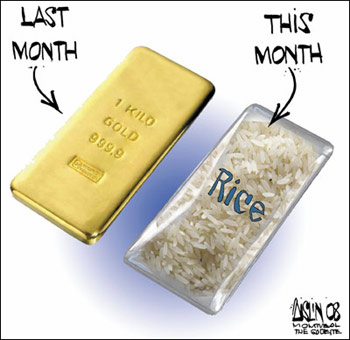WHO CAUSED THE FOOD CRISIS?
 | |
© 2008 Aislin/Montreal Gazette, All Rights Reserved
|
The bad news: There is no quick fix to the world's food crisis -- and it's been coming for a long time.
One cause of the rice shortage is due to the push towards rice cultivation on an industrial scale that promoted monoculture, where a few high-yield rice varieties that needed large doses of chemicals were held up as the answer to growing demand. Small farmers, who used local knowledge over centuries to generate new varieties of paddy seeds that blended with the local environment were marginalized. And it wasn't just Asian rice farmers who were pushed to the sidelines; the EU, the U.S. and other industrialized countries pay large growers a billion dollars a day in subsidies, an unfair advantage that affected all small-scale, local farms.
With stock markets and the property sector in the United States weakening, speculative investors are turning to fuels and the food sector as a "safe haven," driving up prices in the process, the logical result of the transformation of food from a basic human need to an economic "commodity." This has made it easier for investors and trading houses to regard agricultural food as a legitimate target for speculation, hoarding and market manipulation, especially though the futures market.
And then there's the combined crisis of the crashing U.S. economy and rising petroleum prices, which have created a Perfect Storm of a disaster that is ethanol. The United States and the European Union have taken a "criminal path" by contributing to an explosive rise in global food prices through using food crops to produce biofuels, according to the UN special rapporteur on food. More land in the U.S. is pressed into planting corn for biofuel use, even though corn-based ethanol takes more energy to produce that it provides. Much of the rest of the leftover corn kernel also goes to livestock feed, and is a hidden subsidy to yet another wasteful food industry
|






